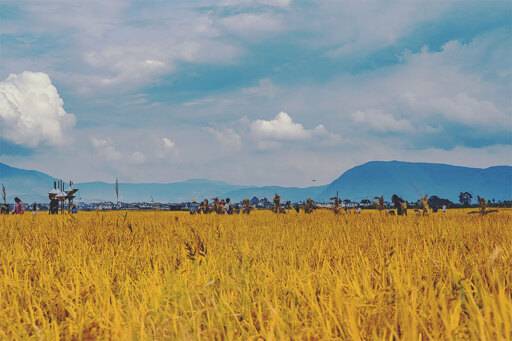This editorial by Ana de Ita originally appeared in the October 14, 2025 edition of La Jornada, Mexico’s premier left wing daily newspaper. The views expressed in this article are the author’s own and do not necessarily reflect those of the Mexico Solidarity Project.
After seven years of changes in rural sector programs, staple grain production is at a breaking point. Agricultural financing was dismantled along with agricultural insurance, marketing institutions and programs disappeared, and subsidies such as Production for Well-being, Fertilizers, and Guaranteed Prices excluded commercial grain farmers.
Surviving as a farmer without government regulations or support is almost impossible, unless they are large producers who can weather the speculative fluctuations of the market and unpredictable natural changes through economies of scale. Everyone else needs institutions, regulations, and subsidies to ensure the profitability of their activities.
But since the last six-year term, the government has transformed agricultural subsidies into welfare subsidies, exclusively for subsistence producers, who cultivate under a different logic. Commercial producers have been abandoned to market forces in the purest form of neoliberalism. They are net losers under the old NAFTA and the current USMCA, as they compete directly with subsidized imports from the United States, controlled by transnational corporations.
It’s up to the government to act with genuine productive policies to guarantee the population’s food security and not leave basic foodstuffs in the hands of transnational corporations and producers from our northern neighbor. After that, it will be too late.
Existing agricultural programs target the vast majority of small producers, whose activities primarily focus on feeding their families, but they have left unsupported a significant percentage of grain production, essential for the country’s food security. In an open economy like Mexico’s, the loss of domestic production translates into greater dependence on the United States, in addition to job losses, dismantling of agricultural production facilities, abandonment of infrastructure, and loss of knowledge.
The first to leave agriculture are the smallest commercial producers, who, without profitability, opt to rent their land to large farmers, who then concentrate production in a few agribusinesses. Under current programs, an estimated 41 percent of farmers and 93 percent of wheat production received no subsidy. Wheat production decreased by 500,000 tons between 2019 and 2024, while imports increased by one million tons over the same period.
In the case of sorghum, 27 percent of producers and 73 percent of production did not receive subsidies. Production volume has remained stagnant since 2018. The government has focused on the production of beans and corn as essential foodstuffs, hence its support for a greater number of producers. The previous administration boasted having achieved self-sufficiency in beans, although it is estimated that 57 percent of its production did not receive subsidies.
Production fell by 200,000 tons between 2018 and 2024. Yellow corn production received less support than white corn, as it is used for livestock feed. Nearly 72 percent of its production did not receive subsidies, compared to 58 percent of white corn production. The effects on corn production were alarming: the harvested volume fell from 27.1 million tons in 2019 to only 24.3 million in 2024.
This 2.8 million-ton reduction led to an increase in imports of 7.1 million tons, reaching 23.6 million tons imported in 2024. For the first time, the volume harvested in Mexico was almost the same as the volume imported. These dismal results in staple grain production during López Obrador’s six-year term partly explain the meager GDP growth in primary activities, at just 0.18 percent annually, the worst performance of all six-year terms since the implementation of NAFTA.
Most commercial producers of basic grains are reaching the limits of their operations, as their activity, without government institutions or support and an open border, has ceased to be profitable. It’s up to the government to act with genuine productive policies to guarantee the population’s food security and not leave basic foodstuffs in the hands of transnational corporations and producers from our northern neighbor. After that, it will be too late.
Basic Grains at the Crossroads
October 14, 2025
The loss of domestic production translates into greater dependence on the United States.
Threats, Lobbying, & Manipulation: Coca Cola Pulls Out Arsenal to Fight Tax
October 14, 2025October 14, 2025
Soft drink companies, with the help of front groups, have been spreading false information and denying scientific evidence about the harm their products cause, in an attempt to stop an upcoming tax.
Continental Meeting of Solidarity with Cuba ends with Demand to end Genocidal Blockade, Support for Venezuela
October 14, 2025
This article by Emir Olivares Alonso originally appeared in the October 13, 2025 edition of La Jornada, Mexico’s premier left wing daily newspaper. Dozens of delegates from 35 countries demanded that the United States government and Congress end the “genocidal” economic, commercial, and financial blockade of Cuba. In the final declaration of the Ninth Continental…
The post Basic Grains at the Crossroads appeared first on Mexico Solidarity Media.
From Mexico Solidarity Media via this RSS feed





